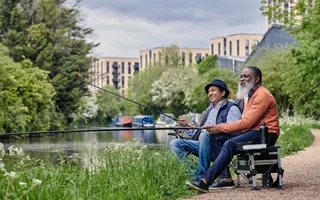Tips for canal fishing success
- Canal fishing is considered by most experienced commentators to need a much greater level of thought and skill than other types of coarse fishing. With plenty of natural food available, canal fish are not always easy to catch.
- Use small hooks, size 20 with hookbaits such as pinkies or squatts.
- Plenty of fish can be caught close to the nearside bank, just 2 or 3 metres from the water's edge.
- Fish on or just off the bottom and introduce small quantities (5-10 maggots) every couple of minutes.
- Probably the most productive place on a canal is on the far shelf about 1 metre from the far bank. Overhanging bushes and trees are also very good areas.
Where not to fish
- Fishing is not allowed in lock chambers, within 25 metres (one boat length) of a lock approach, within 25 metres of a water point or in the vicinity of overhead powerlines.
- Don't fish on rivers during the close season (15 March-15 June inclusive) or on any canal sections that are classified as Sites of Special Scientific Interest (SSSIs).
- Generally you can't fish from the offside bank, except where signed, so please fish from the towing path bank only.
General fishing rules and guidelines
- Discarded hooks and line, bottle, cans and tins can injure or even kill wildlife. Please don't give angling and anglers a bad name. Take your litter home with you
- Beware of birds swimming into your line or eating floating baits, and do your best to avoid accidentally hooking them or entangling them in line.
- Either take your discarded bait home or throw it into the canal for the fish to enjoy at the end of your fishing session.
- Don't keep large amounts of fish in your keepnet for any longer than needed. Make sure your keepnet is securely staked out so the fish have enough room and get plenty of oxygen.
- If you are targeting large fish, please use an unhooking mat to protect the fish while it is out of the water.
- It's illegal to leave rods unattended. A large fish could pull your rod into the water and remain tethered.
- Fishing from a moving boat is not allowed on canals.
- It's illegal to take fish away from the canal under both Environment Agency by-laws and the 1968 Theft Act. All native fish species including pike and carp must be returned to the water. Please report any fish removal immediately to the Environment Agency (England) or Natural Resources Wales.
- If water levels appear unusually low please report this to us.
- It's illegal to bring livebaits from other waters to the canal.
- Don't cut down any trees or bushes without our permission. However, it's ok to clear down a few plants around your peg so you can fish safely.
- Don't light fires.
- Do report any wildlife in distress to the RSPCA.
Protecting wildlife
Although these Angling and wildlife guidelines from the Environment Agency were produced back in 2010, a lot of the general advice is still useful.
Consider other people
- Remove your equipment from the water in good time when a boat approaches. If you decide to hold your pole high in the air, please ensure it is well clear of the passing craft.
- When fishing in a winding hole, boaters wishing to turn their craft have priority, so move your equipment in good time and under no circumstances complain if your peg is disturbed by a turning boat.
- When fishing at visitor moorings, be prepared to pack up and move if yours is the only space available for mooring. When visitor moorings are likely to be busy you may want to find somewhere a little quieter.
- When fishing opposite boats use a pole cup for feeding groundbait and loosefeed. Do not use a catapult or throw groundbait by hand.
- When fishing opposite or near boats which have poeple on board, please avoid disturbing them or making excessive noise.
- If fishing near occupied moored boats in the winter do not break ice before 8am.
- Shipping back your pole to land a fish or change bait or depth is perfectly acceptable, but under no circumstances permanently block the towpath with angling equipment. Please remember to share the space.
- Do not use a bivvy on the towpath unless there is sufficient space for other towpath users to be able to pass safely.
- Do not trespass onto other people's private property.
Your safety and peace of mind
- Be extremely careful if breaking ice. Under no circumstances venture out onto ice.
- Don't fish close to or under overhead powerlines. Modern fishing equipment conducts electricity and sadly there have been a number of deaths and serious injuries caused by carbon fibre rods touching or coming close to overhead wires. Voltage can jump through the air so you do not have to touch the powerline in order to be electrocuted.
- Sadly, accidents occasionally happen when fishing. It is strongly advised that you hold personal liability insurance cover. In the event of an accident occurring while fishing, you could be personally liable.
- Always make sure you are fishing legally. If day membership is available, take enough cash with you to purchase a permit.
- Many sections of canal are only available on a season permit or advance day permit basis, such as those covered by the Waterway Wanderers permit. It's against the law to fish without the necessary advance permissions.
- Remember, anyone 13 and over needs an Environment Agency rod licence, as well as a permit from the controlling angling club or one of our Waterway Wanderers permits in advance. If you go fishing without a rod licence you can be fined up to £2,500 and get a criminal record.
- Catching Weil's disease is a potential risk when fishing, so please cover any cuts with a plaster to reduce the risk of bacteria entering your bloodstream. Make sure you wash your hands before eating or drinking.
- Choose a level area to place your fishing box in safety.
- Swimming in the canal is not allowed and is very dangerous. Do not swim out to retrieve lost tackle, it's not worth the risk of drowning.





